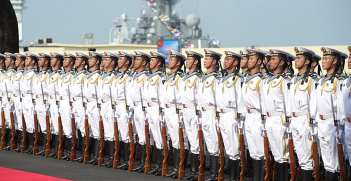Dishonourable Disguise: Securitising Moral Issues
In a world order consumed by ever-changing security issues, the role of securitisation has taken a dangerous form. Political actors have the ability to manipulate the framing of ‘securitisation’ to shape their own agendas.
At the end of February John Kerry and William Hague, foreign ministers of the US and UK, met to discuss the problem of sexual violence in the international order. The US also announced a new measure to obstruct anyone who ‘presided over or engaged in or knew of or conducted these kinds of attacks’ from receiving an entry visa into the United States. With 122 countries having already signed the Declaration of Commitment to End Sexual Violence in Conflict, it is of interest that Kerry and Hague framed the issue of sexual violence as a national security issue rather than a moral scourge. Is the only way to advance this cause to frame it as a national security imperative? Or are politicians using affronts to morality as a way of conducting international agendas?
Reading between the lines, both Hague and Kerry spoke of sexual violence as a foreign affair. The pair spoke of the issue as something that is prevalent in other countries such as the Democratic Republic of the Congo. While war and instability invariably lead to acts of violence, it is irresponsible to place blame exclusively on other countries when the problem also exists much closer to home. For example ‘The Invisible War’, a documentary released in 2012, reported on epidemic levels of rape in the US military; it detailed that a female soldier in the US military is more likely to be raped in combat zones than be killed by enemy fire.
The way in which issues are framed can have a range of consequences both at home and abroad and, as such, we must be attuned to the damage that can be caused by misleading framing. Issues of national concern, if not framed legitimately, can lead to destructive consequences. For example, a well-covered topic is the 2003 invasion of Iraq, an international issue that was framed under a number of security rationales. The military raison d’etre was sold to publics as Saddam Hussein’s supposed weapons of mass destruction. Socially, the issue was framed as a response to affronts to Iraqis’ human rights. Both policy agendas were provided as reasoning for the invasion, presumably to strike the right note with the right sectors of the electorate. In addition, attacks on 9/11 and 7/7 have provided countries with a rationale to tighten border controls as a response to terrorist infiltration.
Security as we see it today is a complex maze of intertwining concepts and ideas. Once, ‘security’ was seen as a purely materialistic, physical concept attributable to issues such as power and military capabilities. Although ‘security’ remains attributable to physical concepts it has more recently been attributed to process-orientated theoretical frameworks that posit and shape ‘security’ into an ideologically-driven concept. These process-orientated frameworks have the potential to mislead.
Securitisation is the process where a certain issue or concept is transformed into a matter of security. For instance, the space race during the Cold War was viewed as not only a way to posture against an international counterpart, but was securitised to bolster the case for space capabilities. Government actors were able to frame social concepts into a political agenda with consequences in the context of international politics and security.
This process of securitisation is a dangerous conduit for political actors to shape political agendas. On a regular basis, political actors can be seen defending their wartime agendas through the use of social reasoning such as the need for humanitarian intervention or the benefit of regional security. Reasons such as these are utilised with great skill and nuance, but these may not reflect the true agenda.
In this light, Hague’s and Kerry’s efforts to securitise the issue of sexual violence is concerning. Providing names of countries around the world lays the groundwork for potential future operations, ones that may lend themselves to future policy agendas. Would it not be wiser to solve these issues through the lens of morality, to provide solutions to these issues through moral instruction?
To frame social issues in a way that misinforms publics to achieve political agendas is a security issue in itself. Citizens must endeavour to be more astute to the ideas that are being sold. The good news is that a securitisation framework does provide audiences with the tools and knowledge to question leaders’ framing of security issues.
Simon Alexander Asfour holds a Master of International Security from the University of Sydney, is a 2010 Honour’s graduate from the University of Manchester where he studied for his Undergraduate degree in Politics and International Relations. He is a former intern at the Australian Institute of International Affairs and has since been employed by a government consultancy which specialise in defence and national security.





